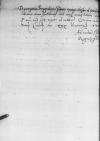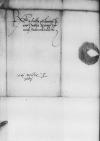Letter #2604
Bona Sforza to Ioannes DANTISCUSCracow (Kraków), 1542-11-30
| received Heilsberg (Lidzbark Warmiński), 1542-12-16 Manuscript sources:
| ||||
Text & apparatus & commentary Plain text Text & commentary Text & apparatus Excerpts concerning Dantiscus' travels
Reverendo in Christo Patri, domino
Reverende in Christo Pater, sincere nobis dilecte.
Accepimus litteras Paternitatis Vestrae, quae nobis gratae fuere, sed adversam illius valetudinem ex animo dolemus quam incolumem ac diuturnam illi favemus plurimum. Excusationem Paternitatis Vestrae ab his nuptiis serenissimi
Nova, quae scripsit Paternitas Vestra de serenissimis regibus inter se dissidentibus, legimus et quamquam rei publicae Christianae adversa sint, tamen officium hoc Paternitatis Vestrae scribendi gratum nobis exstitit. Et in posterum scribat, quicquid huiuscemodi evenerit.
Litteras nostras, quas cum his mittimus, generoso
De prorogatione burgrabiatus famato
Et bene valea[t].
Datae


